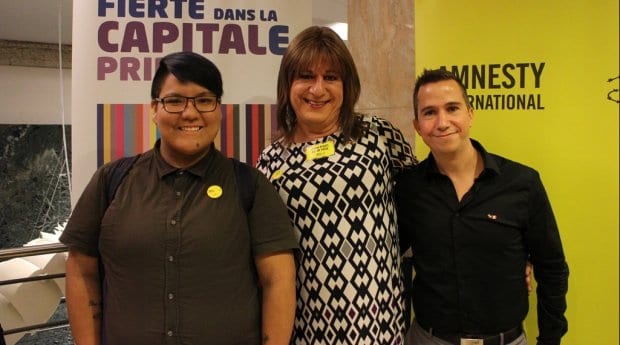Community members took a break from Pride celebrations to reflect on the struggle for human rights and to remember those who’ve lost their lives to violence.
Capital Pride and Amnesty International hosted the Human Rights Vigil at Ottawa City Hall on Aug 20, 2015. Originally slated to take place as a candlelight vigil at the Human Rights Monument, the vigil was moved indoors due to rain.
The ceremony began with a blessing from Annie Smith St-Georges, an Algonquin elder, and her husband, Robert St-Georges. Mauricio Olivares, Capital Pride’s former festival producer who organized the vigil, emceed in English while Hedra Pink repeated his remarks in French.
Gilbert Baker, who designed the iconic rainbow flag, talked about his early days of activism working alongside Harvey Milk, one of the first openly gay elected officials in the US.
“He was an incredibly gifted man, a charismatic artist who really inspired a movement of people because his message was so pure and so simple: that every single one of us needed to come out,” said Baker, who was brought to Capital Pride by the Canadian Centre for Gender and Sexual Diversity and the US Embassy.
“People coming out is still the most important part of our movement,” he said. “It’s something that we share across the generations. It’s still hard for people to come out. I am so saddened when I hear stories of children being thrown out of their homes by their families, the ongoing struggle that people have with drugs and depression, the terrible sad loss to so many by suicide.”
While Baker said he’s happy that the rainbow flag has traveled across continents and cultures, he stressed the fight for LGBT rights has really only begun. Baker also raised the issue of intersectionality when he talked about Pride marchers using toys and trinkets that were built by sweatshop workers.
“Everybody’s going to be waving rainbow flags and sharing their beads and all the wonderful junk,” he said. “With few exceptions, and there are beautiful, beautiful exceptions, most of that is made in factories in China, in Taiwan, by slave labour.”
Baker urged Pride celebrants to think of LGBT people worldwide who are suffering from human rights abuses.
“I hope that when we’re marching, think of them and share our joy, our spirit and that will travel to them, so even though they may not be able to come out to their family, they might be able to come out to themselves because that’s really where it starts,” he said.
Sophia Cassivi, a trans activist from Gender Mosaic, talked about her personal experiences as well as the political struggle for trans rights in Canada.
“We fought very hard with Bill C-279,” said Cassivi, referring to the bill that would have given trans Canadians legal protection from discrimination. Having a transphobic amendment added by the Senate and then having the bill killed by Prime Minister Stephen Harper’s election call were big setbacks, but the fight will continue, she said.
Cassivi also acknowledged MPP Yasir Naqvi, who was among the attendees, thanking him for his support of Toby’s Act, which added gender identity and gender expression to the Ontario Human Rights Code.
Before we fight politically, though, we have to challenge our own discriminatory beliefs, she said. Over the 15 years she’s been with Gender Mosaic, the organization has become more inclusive, Cassivi said. Today, a third of the membership is under age 35, almost a third are francophone, and there members who are people of colour, Jewish and Islamic, she said.
“We start killing discrimination within the organization — within us, within our soul, within our love,” Cassivi said. “We don’t go right away for the big, big fight against tons of people. We go for the fight inside of us.”
After telling anecdotes about coming out to her family, friends and neighbours, she urged people to let go of judgment.
“If we start within, stopping the judgment of each other, stopping the judgment of one’s self, then you start to love yourself and you start to love others,” Cassivi said. “Gender fluid, cross dresser, cross gender, gender queer . . . How do we treat that person? The answer is easy. Like a human being.”
RJ, a Saulteaux Cree activist who identifies as two-spirit, non-binary and uses the pronoun they, talked about the homophobic impact of colonization.
“I really believe 100 percent that the homophobia that comes in my community was taught to my people because it wasn’t the way we were supposed to be before,” RJ said. “I kind of want people to understand that being queer and being indigenous is difficult.”
Due to the homophobia and transphobia created by colonization, it can be hard to feel accepted as a queer, non-binary person in indigenous communities, they said. At the same time, it’s difficult to express your experiences openly in queer communities without triggering other people, RJ said.
“Where do I find that transparency in other communities? A community that chooses to ignore who I am as a human and then another community that [says my truth] is too difficult to listen to.”
Going to Kind, formerly PTS, has been helpful, they said. It’s important for youth — and all communities — to take initiative to create change, RJ said.
The vigil ended with a moment of silence while the names of people who were killed due to homophobic and transphobic violence in the past year were projected on a screen.


 Why you can trust Xtra
Why you can trust Xtra


